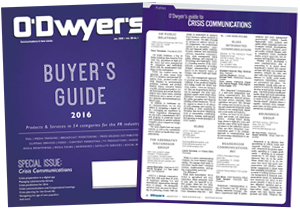|
|
Communication has never been easier or faster. While that is a helpful development in terms of sharing important news far and wide, expansive communication can also be problematic for a number of reasons. Not every news item should be forwarded, nor should every tweet be retweeted. A few simple but solid communication strategies can help to prevent miscommunication in an age of instant gratification facilitated by social media.
Fast and easy communication
Brands can now communicate almost effortlessly with consumers around the globe. All it takes is a few keystrokes on a phone, iPad, or computer, and a message arrives at its destination in a matter of seconds. Chat, videos, and photos are proliferating and traveling at unprecedented rates to almost anywhere on the map.
|
|
Internet technology and mobile phone service have made their way into the far north regions as well as into the depths of tiny villages in remote desert or jungle locations. While not every area has access to these services, countless numbers do, and coverage is growing daily.
Not only can these communication strategies be shared with friends and relatives instantaneously, personal pictures and mindless comments are now posted with intensity and ferocity on numerous social media websites for the world to see.
While we used to worry about the neighbors next door catching us sunbathing in the backyard or overhearing an argument, millions of people now air their most private thoughts and images with billions of strangers. This incredible shift has happened so rapidly that few consider the actual or potential ripple effect.
A casual glimpse at online news outlets reveals not only the latest events but also random comments from viewers who may or may not be who they claim to be. We cannot be sure who is posting the comments, nor can their opinions be validated as sincere, since so many Internet users create one or more fake identities with which they troll cyberspace.
Because this astonishing phenomenon requires a cautious response, especially when a crisis is brewing, it is important to consider the logical approach to crisis communication to deal responsibly with the facts of a situation along with personal emotions and involvement.
Although it has never been easier to communicate in a variety of ways, there has also never been a more important time to measure one’s words before sharing them with or responding to the public at large.
It is also a good idea to frequently review social media connections and feeds to see who is on the lists that receive posted messages. Not every message should be shared with all your followers. Hitting the send key without thinking is almost like firing a gun without aiming. Once sent, a message cannot easily be undone or recalled in all venues.
When not to speak up
Consumers like to share happy news like birth announcements and party invitations as quickly as possible. Brief updates or news tips are also frequently sent. As quickly as they are sharing happy news, they are also sharing questions, issues and complaints. There are certain situations when it is best not to speak up immediately, but rather to wait and decide if a response is truly needed, and if so, what to say, and how, as well as when. A protocol for how to react is imperative.
Don’t respond to rumors or gossip
Be guarded when joining a conversation that circulates messages based on rumors, speculation, or hints. All too often, discussing unfounded facts has a way of coming back to bite you when it becomes known they are false or at least misinterpreted. Anyone who sends messages like these begins to lose the trust of those who read the posted messages. Credibility is compromised. Resist the temptation and wait for the facts to become manifest.
Don’t insult or confront others
Public communication is not the place for targeted conflict. If the issue is with an individual, handle it directly and privately. Throwing verbal darts on social media is in poor taste. It makes the sender look worse than the one at whom they are directed. Public disagreements often encourage others to get involved. Look to diffuse the situation and share the facts about your brand.
Take a beat
Never respond to comments immediately. Chances are you’ll say something that you’ll regret later. Wait until you have all of the facts before responding to a crisis situation.
Many accounts can be given of incidents where someone posted a picture or comment that affected others adversely through personal interaction or forwarding of wrong information. With communication widely accessible at any time, people are interacting for all to see.
Despite our growing dependence on the Internet for most of our daily activities like checking the news, monitoring finances, and communicating with others, it should be used cautiously as a medium of interaction and a source of information. The Web is rife with inaccuracies and misinformation. Everyone who uses the Internet should remember to sift information carefully in search of truth, and to validate facts whenever possible. With the current speed of transmissions, much of what we read is unreliable.
After receiving inflammatory social media comments, it is important to refrain from responding in a knee-jerk manner. If you must share your thoughts, have a protocol in place outlining steps on how to react.
The Internet has made communication accessible to almost anyone for any purpose. It is up to each individual to use communication responsibly. Self-control in an age of self-gratification is essential in many aspects of daily life, including social media. Take time to sift spontaneous communication thoroughly before responding to avoid overreacting or misrepresenting the facts, intentionally or otherwise.
Discretion now will prevent regret later.
* * *
Ronn Torossian is the CEO of 5W Public Relations. 5WPR is headquartered in NYC with offices in Denver and Los Angeles.




 There’s a fine line between newsjacking and taking advantage, aka ambulance chasing. Our job as PR professionals is to tread it carefully.
There’s a fine line between newsjacking and taking advantage, aka ambulance chasing. Our job as PR professionals is to tread it carefully. PR firms need to be mindful of ways their work product may be protected by the attorney-client privilege whenever working with a client’s internal legal team or its external legal counsel.
PR firms need to be mindful of ways their work product may be protected by the attorney-client privilege whenever working with a client’s internal legal team or its external legal counsel. Manuel Rocha, former US ambassador and intenational business advisor to LLYC, plans to plead guilty to charges that he was a secret agent for Cuba.
Manuel Rocha, former US ambassador and intenational business advisor to LLYC, plans to plead guilty to charges that he was a secret agent for Cuba. CEO mentoring is an often-overlooked aspect of why CEOs are able to make good decisions, and sometimes make bad ones—all of which intersects with the role and duties of a board.
CEO mentoring is an often-overlooked aspect of why CEOs are able to make good decisions, and sometimes make bad ones—all of which intersects with the role and duties of a board.  How organizations can anticipate, prepare and respond to crises in an increasingly complex world where a convergent landscape of global challenges, threats and risks seem to arrive at an unrelenting pace.
How organizations can anticipate, prepare and respond to crises in an increasingly complex world where a convergent landscape of global challenges, threats and risks seem to arrive at an unrelenting pace.


 Have a comment? Send it to
Have a comment? Send it to 
No comments have been submitted for this story yet.